Physics
Physics is the study of matter, energy, and the interactions between them. It is a fundamental science that seeks to understand the natural world and the principles that govern it.
Key Concepts in Physics
- Motion and Forces: Physics studies the motion of objects and the forces that cause them to move.
- Energy: Physics explores the different forms of energy, such as kinetic energy, potential energy, and thermal energy.
- Electricity and Magnetism: Physics investigates the behavior of electric charges and magnetic fields.
- Waves and Optics: Physics examines the properties of waves, including light and sound waves, as well as the behavior of light.
- Modern Physics: This area of physics includes topics such as relativity, quantum mechanics, and nuclear physics.
Study Tips for Physics
- Understand the Fundamentals: It's important to grasp the basic concepts and principles of physics, such as Newton's laws of motion, the conservation of energy, and the laws of thermodynamics.
- Practice Problem-Solving: Physics involves a lot of problem-solving, so practice solving different types of problems to solidify your understanding of the material.
- Use Visual Aids: Visual representations, such as diagrams and graphs, can help you understand complex concepts in physics.
- Stay Updated: Keep up with the latest developments in physics by reading scientific journals and following news in the field.
- Seek Help When Needed: If you're struggling with a particular concept, don't hesitate to ask for help from your teacher or a tutor.
Branches of Physics
Physics is divided into several subfields, including:
- Classical Mechanics: The study of the motion of objects and the forces acting on them.
- Thermodynamics: The study of heat and its relation to energy and work.
- Electromagnetism: The study of electric and magnetic fields and their interactions with matter.
- Relativity: The study of the behavior of objects at high speeds or in strong gravitational fields.
- Quantum Mechanics: The study of the behavior of particles at the atomic and subatomic levels.
Understanding the key concepts, study tips, and branches of physics will help you build a solid foundation in this fascinating field of science.
.◂Science Worksheets and Study Guides Sixth Grade. Introduction to earth science
Study Guide Introduction to earth science
Introduction to earth science  Activity Lesson
Activity Lesson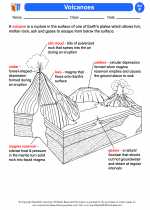 Volcanoes
Volcanoes  Worksheet/Answer key
Worksheet/Answer key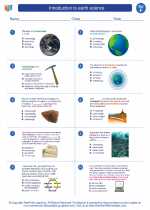 Introduction to earth science
Introduction to earth science  Worksheet/Answer key
Worksheet/Answer key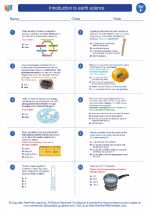 Introduction to earth science
Introduction to earth science  Worksheet/Answer key
Worksheet/Answer key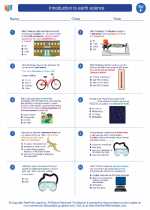 Introduction to earth science
Introduction to earth science  Vocabulary/Answer key
Vocabulary/Answer key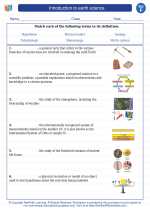 Introduction to earth science
Introduction to earth science  Vocabulary/Answer key
Vocabulary/Answer key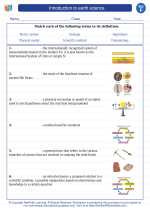 Introduction to earth science
Introduction to earth science 

 Activity Lesson
Activity Lesson
 Worksheet/Answer key
Worksheet/Answer key
 Worksheet/Answer key
Worksheet/Answer key
 Worksheet/Answer key
Worksheet/Answer key
 Vocabulary/Answer key
Vocabulary/Answer key
 Vocabulary/Answer key
Vocabulary/Answer key

The resources above cover the following skills:
EARTH AND SPACE SCIENCE